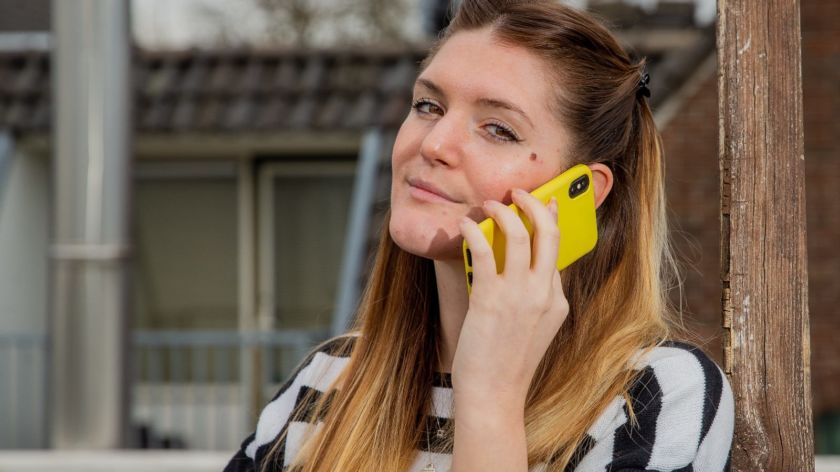Being an international during the Corona crisis: to stay or to go?
-
 Federica Ferrari, photo: David van Haaren
Federica Ferrari, photo: David van Haaren
The coronavirus comes with special challenges for Radboud’s internationals. Three students talk about their experiences in-between Hong Kong, Indonesia, Italy, Germany and the Netherlands. ’Something like this has the potential to change national sentiments.’
Federica Ferrari (23, Master student Marketing, from Italy)
‘I’m from Bergamo. Right now, my home is the worst corona region in Italy. Where my family is living, they don’t have enough beds for all the sick people, so doctors have to decide whom they are going to save. At this point, there are so many dead bodies in Bergamo that they have to take them to other regions in Italy. People need to realise that you can die of this virus.
My parents and siblings are not in the high-risk group, so I’m not that scared for them, but I am really scared for my grandparents. Primarily for my grandmother, because she is living alone. This is not only a dangerous situation for the physical health of many people, but also a mental health challenge, especially when dealing with the isolation by yourself.
I have been self-isolating for a week, only going out for groceries. Over the past days, the Netherlands have established more measures, but this is still not enough. Closing down the restaurants and universities has been the right step. But especially the supermarkets are so crowded right now, that it’s just not safe. There need to be regulations. Also on quarantining, because I don’t know if people are taking the suggestion to self-isolate serious enough.
Since I’m the only person from Italy in my friend group, I’ve been trying to warn them about the seriousness of this situation. At first, they were saying “It’s just a virus, you won’t die of it”, but since a few days, they have kept calling me, saying “Federica, you were right.”
Francesca Gatterburg (21, Bachelor student English Language and Culture, from America/Germany)
‘I remember reading about the virus a few months ago in an international newspaper for the first time. My friends and I were talking about it and praying for the people in China. Now, it’s affecting all of us. I began to realise that when I travelled to Switzerland at the end of January and saw people with face masks. The rapidness with which this situation escalated was surprising.

It was a difficult decision, but I left the Netherlands on Monday. Now, I’m staying with my boyfriend in Germany, self-isolating for two weeks. After that, I’m going to travel to my father, who also lives in Germany. He’s in a high-risk group, that’s why I’m self-quarantining now.
I think this is a really incredible situation. It puts everything in perspective. I left Nijmegen by car, together with a friend and for the first time in our lifetimes, we thought consciously about the possibility of a hard border between Germany and the Netherlands. To drive over an almost empty highway and expecting some kind of border patrol was completely surreal.
Right now, I’m not worried about the future, because I don’t think we can do much about it. I am, however, asking myself how this situation will be evaluated historically. Was this how we were supposed to handle it? Are we doing the right things? I believe that something like this has the potential to change national sentiments.’
Selena Soemakno (20, Bachelor student Arts and Culture Studies, from Indonesia)
‘I began my exchange in Hong Kong in January and attended my orientation week and two weeks of classes before the Chinese New Year’s break. After that, the corona virus situation got a bit more worrisome. So my parents, who are living in Hong Kong, and I decided to leave the city and stay with family in Indonesia. The plan was to live with them for two weeks. Now I’ve been here for more than two months.

The entire situation is quite draining right now. I really thought my exchange would be an easy experience, because I could stay with my parents and only focus on my studies and my thesis. Now, I’m living with relatives and have to take my classes online in a bedroom without a proper table to study at. It would have been possible to cancel the exchange entirely and return to Nijmegen. But that would have probably pushed back my graduation by a semester. That’s why I decided to continue.
I’m still in contact with other exchange students, some of which are still in Hong Kong, others who were pulled out by their home universities. This situation is quite interesting. The locals seem way more cautious about it, whereas a lot of exchange students from Europe and the U.S. have a different mindset. Some of them have got more worried as the situation changed in Europe as well. But I know a few Swedish students who are still traveling to Korea or Japan even with the quarantine. Similarly, some people in Indonesia don’t seem to really realise the severity of the situation. While others are buying all the soap and hand sanitisers at the supermarkets. Which results in people who need it, not being able to access it anymore. These extremes in dealing with the virus don’t help anyone.’



